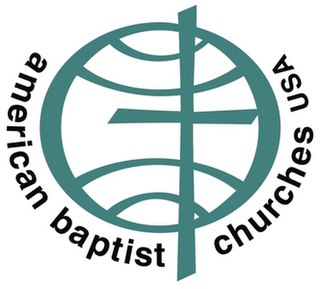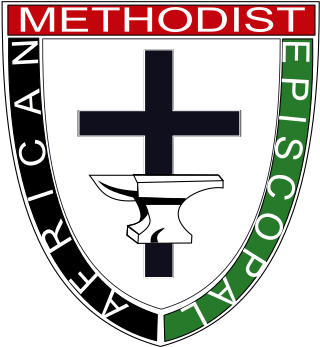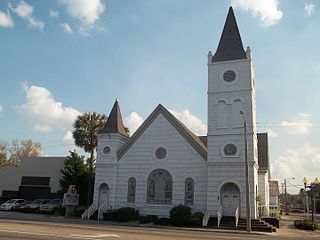Related Research Articles

The American Baptist Churches USA (ABCUSA) is a Baptist Christian denomination established in 1907 originally as the Northern Baptist Convention, and from 1950 to 1972 as the American Baptist Convention. It traces its history to the First Baptist Church in America (1638) and the Baptist congregational associations which organized the Triennial Convention in 1814. Headquartered in Valley Forge, Pennsylvania, ABCUSA is usually considered mainline, although varying theological and mission emphases may be found among its congregations, including modernist, charismatic and evangelical orientations.

The African Methodist Episcopal Church, usually called the AME Church or AME, is a Methodist Black church. It adheres to Wesleyan-Arminian theology and has a connexional polity. The African Methodist Episcopal Church is the first independent Protestant denomination to be founded by black people; though it welcomes and has members of all ethnicities.

William Henry Willimon is a retired American theologian and bishop in the United Methodist Church who served the North Alabama Conference for eight years. He is Professor of the Practice of Christian Ministry and Director of the Doctor of Ministry program at Duke Divinity School. He is former Dean of the Chapel at Duke University and is considered by many as one of America's best-known and most influential preachers. A Pulpit & Pew Research on Pastoral Leadership survey determined that he was one of the two most frequently read writers by pastors in mainline Protestantism alongside the Roman Catholic writer Henri Nouwen. His books have sold over a million copies. He is also Editor-At-Large of The Christian Century. His 2019 memoir Accidental Preacher was released to wide acclaim, described by Justo L. Gonzalez as "An exceptional example of theology at its best."

The Chicago Theological Seminary (CTS) is a Christian ecumenical American seminary located in Chicago, Illinois, and is one of several seminaries historically affiliated with the United Church of Christ. It is the oldest institution of higher education in Chicago, originally established in 1855 under the direction of the abolitionist Stephen Peet and the Congregational Church by charter of the Illinois legislature.

Circuit rider clergy, in the earliest years of the United States, were clergy assigned to travel around specific geographic territories to minister to settlers and organize congregations. Circuit riders were clergy in the Methodist Episcopal Church and related denominations, although similar itinerant preachers could be found in other faiths as well, particularly among minority faith groups.
Robert Sheldon Duecker was an American bishop of the United Methodist Church, elected in 1988.

The black church is the faith and body of Christian denominations and congregations in the United States that minister predominantly to, and are led by, African Americans, as well as these churches collective traditions and members. The term "black church" may also refer to individual congregations in traditionally white denominations.

Garrett–Evangelical Theological Seminary (Garrett) is a private seminary and graduate school of theology related to the United Methodist Church and is ecumenical in spirit. It is located in Evanston, Illinois, on the campus of Northwestern University. The seminary offers master's- and doctoral-level degrees, as well as certificate, micro-credentialing, and lifelong learning programs. It has thousands of alumni serving in ministry, education, organizational leadership, and public service throughout the world.
Roy Isao Sano is a retired Japanese-American bishop of the United Methodist Church, elected in 1984.
David Jerald Lawson was an American who gained notability as a pastor and university campus minister in the Methodist and United Methodist churches, as a district superintendent, annual conference official, and as a bishop of the United Methodist Church (UMC), elected in 1984. He also played a key role establishing and developing Africa University, which is the only UMC university on the continent.
Edsel Albert Ammons was an American bishop of the United Methodist Church, elected in 1976.
Bruce Robert Ough is a United Methodist Church bishop, elected in 2000.
Bryan P. Stone is an American theologian who is the Associate Dean of Academic Affairs and the E. Stanley Jones Professor of Evangelism at Boston University School of Theology, and a Co-director of the Center for Practical Theology. Stone writes on topics related to both systematic theology and practical theology. He is associated with both postliberalism and Christian pacifism, having been influenced by thinkers such as John Howard Yoder, Stanley Hauerwas, Alasdair MacIntyre, and John Wesley, and in his earliest work with liberation theology and process theology.
Joseph Carl Hough Jr. was an ordained minister in the United Church of Christ and served as the interim president of Claremont Graduate University in Claremont, California from 2009 to 2010. He is an author, coauthor, and editor of several books.
Ralph Basui Watkins is the Peachtree Associate Professor of Evangelism and Church Growth at Columbia Theological Seminary, in Decatur, Georgia, United States. He also serves as the senior pastor of the historic Wheat Street Baptist Church in Atlanta, Georgia, United States.
Lyle Edwin Schaller was an American parish consultant, author, workshop leader, and speaker whom Christianity Today called “the dean of church consultants”.

First Presbyterian Church is a historic Presbyterian congregation in Hattiesburg, Mississippi, founded in 1882 by Rev. A. B. Coit. It was the first church in the town and predated Hattiesburg's own incorporation by two years. In 1973 it left the Presbyterian Church in the United States to become a charter member of the more theologically conservative Presbyterian Church in America.
Jeffery Tribble is an ordained elder in the African Methodist Episcopal Zion Church and a professor of ministry with research interests in Practical Theology, Congregational Studies and Leadership, Ethnography, Evangelism and Church Planting, Black Church Studies, and Urban Church Ministry. Academics and professionals in these fields consider him a renowned thought leader. Tribble's experience in pastoral ministry allows for his work to bridge the gap between academic research and practical church leadership.

Glenn M. Wagner is an American United Methodist pastor and author. Throughout his 40-year pastoral career, Wagner served congregations in four states and two countries, most notably in Freeport and Harvard, Illinois and North Muskegon, Holt, and Grand Haven, Michigan. Wagner announced his retirement from the United Methodist Church of the Dunes in Grand Haven in October 2016.
Joy Jittaun Moore is Professor of Biblical Preaching and serves as vice-president for Academic Affairs and Academic Dean at Luther Seminary in St. Paul, Minnesota.
References
- ↑ Steven M. Tipton (15 September 2008). Public Pulpits: Methodists and Mainline Churches in the Moral Argument of Public Life. University of Chicago Press. pp. 128–. ISBN 978-0-226-80476-7.
- ↑ "Garrett names new president" Archived 2016-03-04 at the Wayback Machine . Evanston Now. By Bill Smith on May 16, 2013.
- ↑ "Pastor Named to Run Theological School" Archived 2015-10-12 at the Wayback Machine . Los Angeles Times. August 19, 2000
- ↑ Smith, Jr., Luther E. (2007). Intimacy and Mission: Intentional Community as Crucible for Radical Discipleship. Eugene, Oregon: Wipf and Stock. ISBN 978-1-55635-537-0.
- ↑ Indiana. General Assembly. House of Representatives (1980). Journal of the House of Representatives of the State of Indiana at Their ... Session. State Printer. p. 37.
- ↑ Frick, Don M. (2004). Robert K. Greenleaf (2004 ed.). San Francisco: Berrett-Koehler. p. 302. ISBN 1-57675-276-3. Archived from the original on 2022-07-13. Retrieved 2020-12-19.
- ↑ Frick, Don; Spears, Larry (1996). The Private Writings of Robert K. Greenleaf . San Francisco: Jossey-Bass. p. 355. ISBN 0-7879-0230-6.
- ↑ Greenleaf, Robert K. (1983). Seminary as Servant. Peterborough, New Hampshire: Windy Row Press.
- ↑ Capshew, James (2012). Herman B Wells: The Promise of the American University. Bloomington, Indiana: Indiana University Press. pp. 363–368. ISBN 978-0-25335720-5. Archived from the original on 2022-07-13. Retrieved 2020-12-19.
- ↑ "A Twist of Faiths: Claremont's Mission to Desegregate Religion" Archived 2018-04-04 at the Wayback Machine . Pacific Standard, Suzanne Sataline Jun 22, 2012
- ↑ Jon M. Sweeney; Michal Woll (15 October 2013). Mixed-Up Love: Relationships, Family, and Religious Identity in the 21st Century. FaithWords. pp. 59–. ISBN 978-1-4555-4590-2.
- ↑ "Choosing Peace through Daily Practices" Archived 2016-03-05 at the Wayback Machine . Book Review by Frederic and Mary Ann Brussat, Spirituality and Practice.
- ↑ Howard A. Snyder (3 December 1996). Liberating the Church: The Ecology of Church and Kingdom. Wipf and Stock Publishers. pp. 276–. ISBN 978-1-57910-013-1.